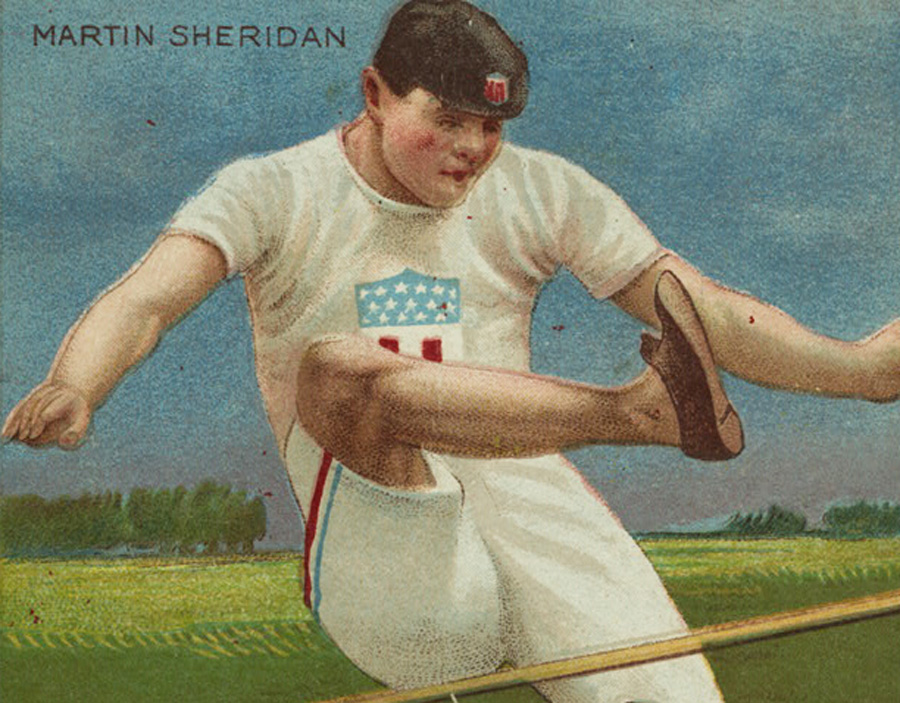Martin Sheridan - Ireland’s greatest Olympian
[This article was originally written for Sunday Miscellany on RTÉ Radio One and was broadcast in August 2016. To listen back to the programme click here]
It’s Swinford Railway Station on Friday, 31 July 1908. A young Irish emigrant jumps down onto the platform carrying a case with his clothes in it. He is back in Mayo and intent on travelling to his father’s farm in the nearby parish of Bohola
His name is Martin Sheridan – he had emigrated at the age of 18 to America and now, 9 years later, he works for the New York Police.
This is no typical emigrant journey home, however. When the train carrying Sheridan was pulling into the town, the Swinford Band began playing ‘See The Conquering Hero Comes’ – and all the approach roads to the train station were thronged with people.
Martin Sheridan had wished to slip quietly home to see his family – but that’s not easy when you have just won two gold medals in discus throwing and one long jump bronze at an Olympic Games.
Those medals – won at the London Olympics – were the crowning glory of Sheridan’s career. By the time he retired from athletics he had won 5 gold, 3 silver and 1 bronze medal at Olympic Games. He had also created 16 world records in various competitions, as well winning multiple U.S. championships. It was joked that he could play pitch-and-toss with his medals and never be concerned at losing a couple.
Put simply: Martin Sheridan was the greatest all-round athlete of the age.
Now, though, his great challenge would be to make it through Swinford. He had told nobody that he was coming home, but news of his presence on the train had been wired from Dublin to Swinford. The news then spread like a prairie fire across that town – and out into the countryside.
A public meeting, a banquet in the Commercial Hotel, and a reception were immediately organised. Photographs were taken of him holding the discus at various places, including at the back of Lambe’s pub.
And, of course, he had to make a speech. That speech is still wonderful to read. It was laced with modesty and humour and even politics. The fact that Ireland was not an independent country, he said, was an injustice which had to end. There was also the bitter regret that he had emigrated because there was no future before him in Ireland – and that there seemed to be no future for any lad his age to stay.
Mostly, though, his words are a celebration of pride in coming from a rural area in Co. Mayo and conquering the world.
‘I am once more with my own,’ he said,’ and I don’t think there are twenty people in this room who are not related to me in some way or other. In many a hard-fought contest, when only inches lay between me and the prize, I have often thought of you, and these thoughts never failed to make me gird my energies and drive my Swinford blood coursing madly through my veins in my efforts to achieve victory.’
The wild applause in Swinford was nothing compared to the reception in Bohola, where a magnificent open-air meeting was staged. His parents – Joe and Kitty – were there to hear Martin feted by, among others, the schoolteacher who had taught him his ABCs.
And the rest of August 1908 was a whirl. Everywhere that Martin Sheridan went, he was met by huge crowds. The trains he took were stopped at every station to allow local people meet him and sing to him. In Dublin he was carried shoulder high from Broadstone Train Station to the Lord Mayor’s Carriage and on to a reception at the Gresham Hotel.
He left Ireland in September 1908 and returned to work in the police department in New York. He retired from athletics in 1911 at the age of 30, but progressed through the police ranks, becoming a detective and serving as special bodyguard to the Governor of New York.
On Saturday, 23 March 1918, a group of his friends organized a surprise party for him to celebrate his 37th birthday. The party never happened. Sheridan had been admitted to hospital the previous day, suffering from pneumonia. He rallied and slipped and rallied again. Until, five days later, his condition deteriorated rapidly and he died on 27 March 1918.
A huge crowd attended his funeral – the men he worked with and played with wept openly on the street. In the months and years that followed, medals and cups were named in his honour, monuments were erected in America and in Ireland, and his memory remained alive in song and verse. He was, as the inscription on his grave reads:
An Intrepid American,
An ardent lover of his motherland;
A Peerless athlete;
Devoted to the institutions of his country
And to the ideals and aspirations of his race.
Paul Rouse is a Professor in the School of History, University College Dublin





















